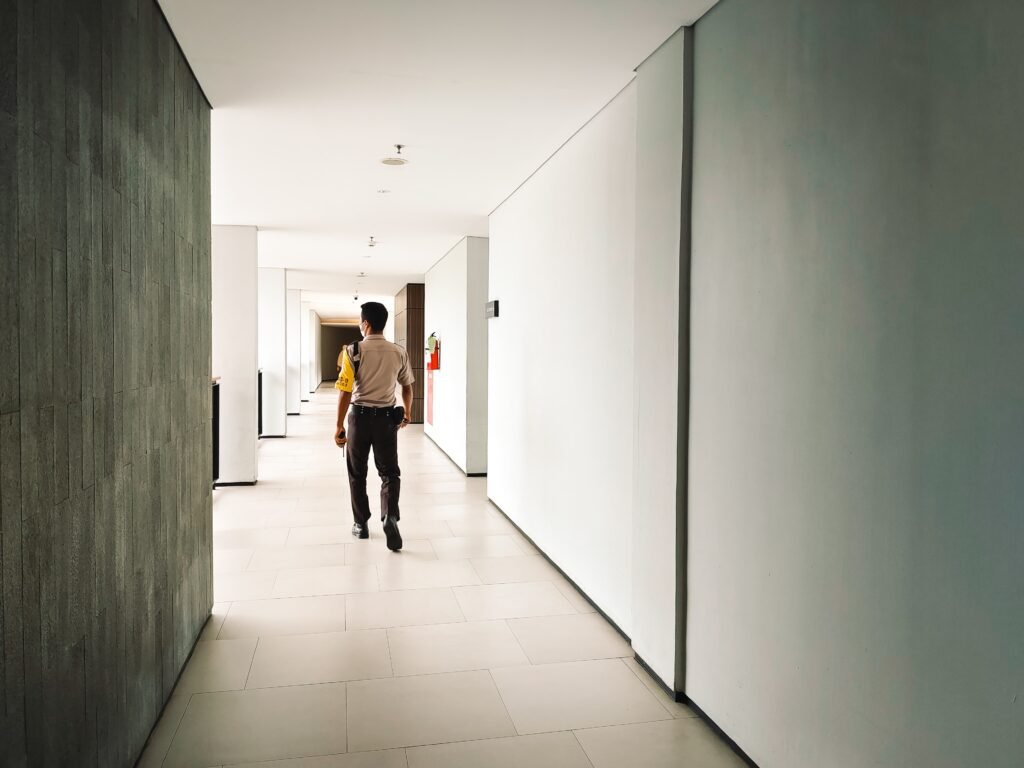Imagine arriving at your hotel room after a long day of traveling, ready to relax and unwind. But have you ever stopped to wonder just how secure your hotel room door is? With reports of break-ins and thefts becoming increasingly common, it is important to question the safety measures put in place by hotels. In this article, we will explore the level of security provided by hotel room doors, giving you peace of mind and ensuring a worry-free stay during your travels.

Types of hotel room doors
Traditional mechanical locks
Traditional mechanical locks are the most basic type of lock used in hotel room doors. These locks typically require a physical key to open and close the door. They rely on a mechanical mechanism such as tumblers or pins to secure the door. While these locks have been around for a long time and are reliable, they can be prone to picking and bypassing techniques. However, they are still commonly used in many hotels.
Electronic locks
Electronic locks are a more modern and advanced option for securing hotel room doors. These locks use electronic mechanisms to control access. Instead of a physical key, these locks often use keypads, touchscreens, or RFID cards to unlock the door. Electronic locks offer greater security compared to traditional mechanical locks, as they are more difficult to pick or bypass. They also often incorporate additional features such as audit trails, which record every entry and exit to the room.
Key card systems
Key card systems are a specific type of electronic lock that utilizes cards with embedded RFID chips. These cards are used to gain access to the hotel room by simply holding the card near the door lock. Key card systems are widely used due to their convenience and ease of use. Additionally, these systems can be easily programmed, allowing hotels to quickly deactivate lost or stolen cards. However, vulnerabilities such as cloning or hacking of the key cards can pose a risk to the security of hotel room doors.
Common vulnerabilities in hotel room doors
Weak or easily bypassed locks
One of the most common vulnerabilities in hotel room doors is the use of weak or easily bypassed locks. Some hotels may opt for cheaper locks that are susceptible to picking or manipulation. This puts guests at risk of unauthorized access to their rooms by individuals with malicious intent.
Misplaced master keys
Another vulnerability arises when hotels fail to properly secure their master keys. The master keys provide access to all hotel rooms, and if they fall into the wrong hands, it can lead to unauthorized access to multiple rooms. Misplaced or stolen master keys can result in theft, privacy invasion, and other security breaches.
Lack of inspection and maintenance
A common oversight in hotel security is the lack of regular inspection and maintenance of the door locks. Over time, locks can become worn or damaged, making them easier to bypass. If hotel management fails to address these issues promptly, it increases the risk of unauthorized access and compromises the security of the hotel room doors.
Limited security features
Some hotel room doors may lack advanced security features, making them more vulnerable to breaches. For example, doors without deadbolts, peepholes, or additional reinforcements can be easier to tamper with. These limitations in security features may result in increased risks for guests staying in these rooms.
Potential risks of hotel room doors
Unauthorized access
One of the primary risks of insecure hotel room doors is unauthorized access. If an intruder gains access to a guest’s room, they can steal valuables, compromise privacy, or even commit acts of violence. Unauthorized access to hotel room doors presents a significant threat to guest safety and security.
Theft and burglaries
Inadequate security measures can also increase the risk of theft and burglaries. With weak or easily bypassed locks, thieves and burglars can gain entry to hotel rooms and steal personal belongings or valuable items. Guests may suffer financial losses or emotional distress due to these incidents.
Privacy invasion
Privacy invasion is a major concern when it comes to hotel room door security. Guests expect their personal space to be respected and protected during their stay. If hotel room doors are not secure, it becomes easier for unauthorized individuals to invade guests’ privacy by entering their rooms without permission.
Stalking and harassment
In extreme cases, insecure hotel room doors can lead to stalking and harassment. If an individual with malicious intent gains access to a guest’s room, they may engage in unwanted behaviors such as surveillance, harassment, or even physical assault. This can have severe psychological and physical consequences for the victim.
Security measures implemented by hotels
Advanced lock technology
Hotels are increasingly implementing advanced lock technology to enhance the security of their room doors. This includes the use of electronic locks with sophisticated encryption protocols that are difficult to bypass or hack. Some hotels also invest in cutting-edge biometric authentication systems, which utilize fingerprints or facial recognition to grant access to guest rooms.
Key management systems
To mitigate the risk of misplaced or stolen master keys, hotels employ key management systems. These systems track the usage and location of master keys, ensuring that they are properly accounted for at all times. By implementing strict protocols for key handling and storage, hotels can significantly reduce the risk of unauthorized access through misplaced master keys.
Video surveillance
Video surveillance is an essential security measure that many hotels utilize to deter crime and monitor hotel premises. Surveillance cameras placed strategically around the hotel can monitor activity in common areas, hallways, and near entrance points. This helps to identify potential threats and deter criminals from targeting hotel rooms.
Security personnel
Hotels often employ security personnel who are responsible for monitoring guest areas and responding to security incidents. These personnel are trained to detect suspicious behavior, handle emergencies, and ensure the safety of guests. By having a visible security presence, hotels can create a sense of security and deter potential criminals.

Security standards and certifications for hotel room doors
ANSI/BHMA grading standards
The American National Standards Institute (ANSI) and Builders Hardware Manufacturers Association (BHMA) have established grading standards for commercial door locks. These standards provide a way to assess the durability, strength, and performance of locks, including those used in hotel room doors. Higher grades indicate stronger and more secure locks.
UL certification
Underwriters Laboratories (UL) offers certifications for security products, including door locks. UL certification indicates that the lock has undergone rigorous testing and meets specific security standards. For hotels, choosing door locks with UL certification can provide assurance that the locks meet industry standards for security.
Fire ratings
In addition to security, hotel room doors must comply with fire safety regulations. Fire-rated doors are specially designed and tested to withstand fire for a specific period of time. These doors serve a dual purpose of ensuring guest safety in case of a fire while also providing an additional layer of security.
ADA compliance
The Americans with Disabilities Act (ADA) sets standards for accessibility in public accommodations, including hotels. ADA-compliant hotel room doors are designed to be accessible to individuals with disabilities. These doors often have features such as wider clearances, lever handles, and alternative methods of opening, ensuring that all guests can enter and exit their rooms safely and easily.
Case studies of hotel room door security failures
Famous hotel breaches
There have been several high-profile cases of hotel breaches that have highlighted the vulnerabilities in hotel room door security. For example, in 2014, a major hotel chain experienced a data breach that resulted in the exposure of customers’ personal information, including credit card details. This breach emphasized the importance of not only securing physical access to hotel rooms but also protecting guest information from cyber threats.
Incidents of door malfunction
Instances of door malfunctions have also raised concerns about the reliability and security of hotel room doors. Reports of doors failing to lock properly or becoming stuck have led to guests being locked out or unable to secure their rooms. These incidents underline the need for regular maintenance and inspections to ensure that hotel room doors function as intended.
Customer complaints and feedback
Customer complaints and feedback often shed light on security issues related to hotel room doors. Guests might share their experiences of feeling unsafe or having concerns about the security measures in place. These anecdotes are valuable for identifying areas where security improvements may be necessary, such as upgrading locks or implementing additional safety measures.

Tips for travelers to enhance hotel room door security
Use door stoppers or portable alarms
Travelers can enhance their hotel room door security by using door stoppers or portable alarms. Door stoppers can be wedged under the door to prevent it from being opened from the outside. Portable alarms can alert guests if someone attempts to enter their room, providing an added layer of security and peace of mind.
Keep valuables in hotel safes
To protect valuable items such as passports, cash, and jewelry, it is advisable to use the hotel’s in-room safe or the front desk safe. This reduces the risk of theft from hotel room doors and provides a secure space to store important belongings while exploring or resting.
Double-check door locks
Before leaving the hotel room or going to sleep, take a moment to double-check that the door is properly locked. Ensure that deadbolts and any additional security features are engaged. Double-checking the door locks can prevent unwanted access and help to maintain a sense of security throughout the stay.
Avoid sharing personal information
Travelers should be cautious about sharing personal information with strangers or hotel staff. Avoid disclosing room numbers or other sensitive information that could potentially compromise the security of hotel room doors. Being aware of who has access to this information helps to minimize the risk of unauthorized access.
Importance of reporting security concerns to hotel management
Prompt response to security threats
Reporting security concerns to hotel management is crucial for prompt resolution of security threats. By notifying hotel management about suspicious activities, malfunctioning door locks, or potential vulnerabilities, guests can contribute to the overall safety and security of the hotel. Prompt response to security threats helps prevent incidents and minimizes any potential harm.
Preventing future incidents
Effective reporting of security concerns to hotel management can lead to proactive measures being taken to prevent future incidents. By addressing vulnerabilities identified by guests, hotels can implement necessary security upgrades or improve staff training to enhance the overall security of their room doors. This ensures that future guests are protected from potential risks.
Ensuring guest safety and satisfaction
Guest safety and satisfaction are top priorities for hotels. By reporting security concerns, guests play an active role in ensuring their own safety and that of other guests. Properly addressing these concerns helps to maintain a safe and comfortable environment, leading to increased guest satisfaction and a positive reputation for the hotel.

Emerging technologies for hotel room door security
Biometric authentication
Emerging technologies such as biometric authentication are revolutionizing hotel room door security. Biometric systems use unique physical characteristics like fingerprints or facial recognition to allow access. These systems offer a high level of security as they are difficult to forge or duplicate.
Wireless access control systems
Wireless access control systems integrate technology to manage and control access to hotel room doors. These systems eliminate the need for physical keys or cards, allowing guests to use their smartphones to unlock their doors. Wireless access control systems offer convenience, flexibility, and enhanced security.
Smart locks and IoT integration
Smart locks are IoT-enabled devices that connect to the internet and can be controlled remotely through smartphones or other connected devices. These locks offer features such as remote access, temporary access codes for guests, and the ability to monitor door activity. The integration of smart locks with IoT technology provides advanced security and convenience for hotel guests.
Virtual keys and mobile apps
Virtual keys and mobile apps are becoming increasingly popular in the hospitality industry. Guests can use their smartphones to access their rooms, eliminating the need for physical keys or cards. Virtual keys are typically sent directly to guests’ smartphones and can be easily deactivated or reprogrammed, enhancing security and convenience.
Conclusion
Ensuring the security of hotel room doors is of utmost importance to protect guests’ safety, privacy, and belongings. Traditional mechanical locks, electronic locks, and key card systems are the most common types of locks used. However, vulnerabilities such as weak locks, misplaced master keys, and lack of inspection and maintenance can compromise security.
The potential risks of insecure hotel room doors include unauthorized access, theft, invasion of privacy, and harassment. To address these risks, hotels implement security measures such as advanced lock technology, key management systems, video surveillance, and security personnel.
Security standards and certifications, including ANSI/BHMA grading standards, UL certification, fire ratings, and ADA compliance, help ensure that hotel room doors meet industry standards.
Through case studies of hotel room door security failures, best practices for travelers to enhance security are discussed, such as using door stoppers, keeping valuables in hotel safes, double-checking door locks, and avoiding sharing personal information.
Reporting security concerns to hotel management is essential for prompt response, prevention of future incidents, and ensuring guest safety and satisfaction.
Emerging technologies, including biometric authentication, wireless access control systems, smart locks, and virtual keys, offer innovative solutions to enhance hotel room door security.
By taking comprehensive steps to improve hotel room door security, hotels can provide a safe and secure environment for their guests, promoting a positive guest experience and peace of mind.








